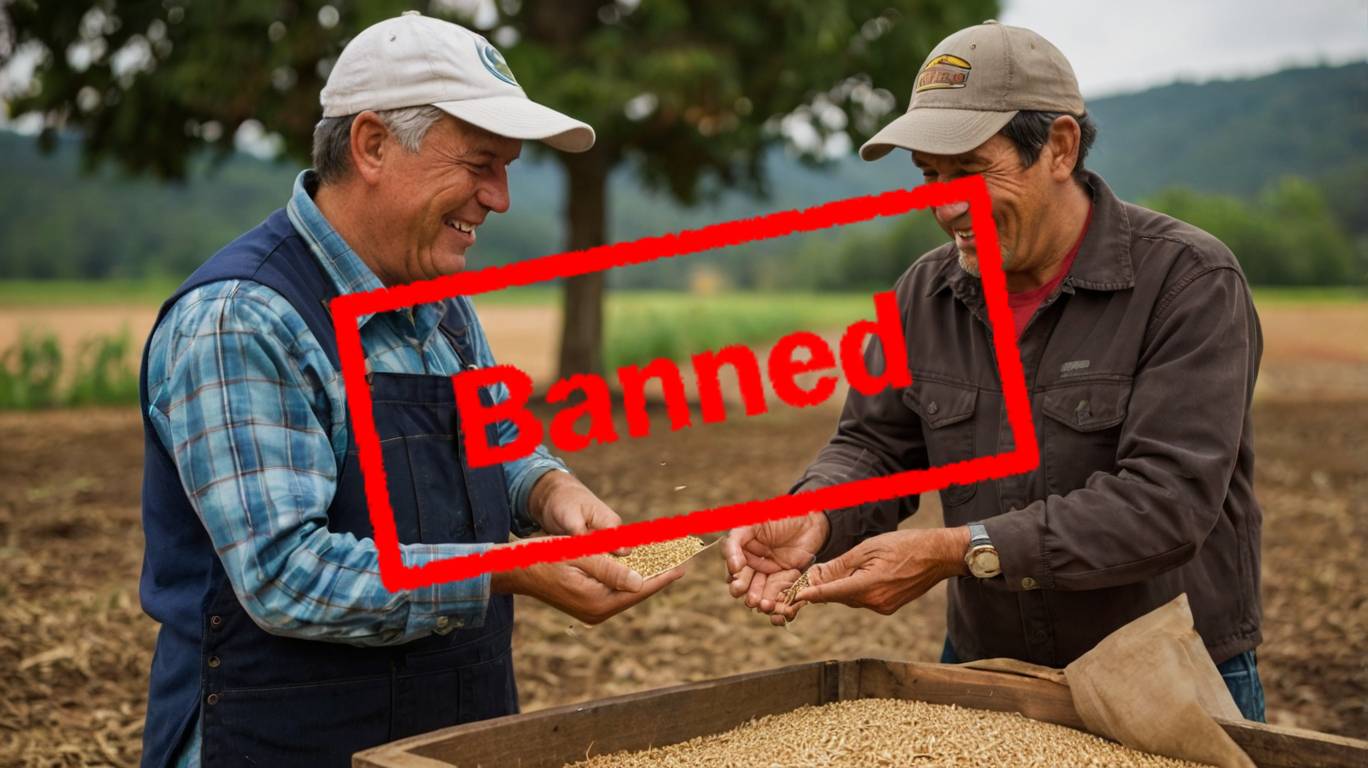
In a move that has sparked controversy and raised concerns among farmers worldwide, the World Economic Forum (WEF) is advocating for legislation that would limit farmers’ rights to save, share, exchange, or sell unregistered seeds.
This push for stricter seed regulations has ignited a heated debate about food sovereignty, agricultural practices, and the future of global food systems.
The proposed laws, which align with the WEF’s vision for a sustainable and net-zero emissions agriculture sector, have met with fierce resistance from farming communities. Critics argue that such regulations could undermine traditional farming practices and increase dependency on large agribusiness corporations.
“We had enough. For the last 20 years we've been attacked by the political classes, telling us how to farm in the countryside. We're now being paid to stop growing food and grow wildflowers. It's insanity." pic.twitter.com/r2FwjW4DQ2
— James Melville 🚜 (@JamesMelville) September 1, 2024
“We’ve had enough,” declared a British farmer who wished to remain anonymous. “For the last 20 years, we’ve been attacked by the political classes, telling us how to farm in the countryside. We’re now being paid to stop growing food and grow wildflowers. It’s insanity.”
“Governments are going after farmers? They grow our food goddammit. They are going after farmers? There’s no way in which that’s positive.”
— James Melville 🚜 (@JamesMelville) August 4, 2024
~ Joe Rogan 🎯
pic.twitter.com/82Oief9z0H
The sentiment is echoed by popular podcast host Joe Rogan, who expressed disbelief at the situation: “Governments are going after farmers? They grow our food, goddammit. There’s no way in which that’s positive.”
The WEF’s proposals are part of a broader strategy to transition global agriculture towards more sustainable practices. The organization argues that significant investments are needed to help farmers adopt climate-smart and nature-positive agricultural methods. According to WEF estimates, the global food system requires approximately $350 billion annually by 2030 to transition to sustainable practices – a figure that dwarfs the current investment level of about $20 billion per year.
🚨🇬🇧 Food Shortages – British Farmer
— Concerned Citizen (@BGatesIsaPyscho) July 18, 2024
“The Government has offered us a scheme whereby we get paid for not supplying food for 3 years”
Don’t believe farming & food supply is under attack – listen to this Cornish Farmer explain how he’s financially incentivised by the State NOT… pic.twitter.com/Lj3YXgG3fD
However, many farmers view these initiatives with skepticism. Another British farmer revealed, “The Government has offered us a scheme whereby we get paid for not supplying food for 3 years.” This approach has led to accusations that policymakers are prioritizing environmental goals at the expense of food security.
Seed law in Kenya
The debate over seed regulations is not new. In Kenya, a 2012 law prohibits farmers from saving, sharing, exchanging, or selling unregistered seeds, with penalties including up to two years in prison and hefty fines.
In 2022, Kenyan smallholder farmers launched a legal case against the government, calling for reform of the 2012 seed law. The case, scheduled for a hearing on July 24, 2024, underscores the ongoing struggle between farmers’ rights and corporate interests in the seed industry.
The Alliance for a Green Revolution in Africa (AGRA), an initiative funded by the Gates and Rockefeller Foundations, has been instrumental in shaping agricultural policies across the continent. AGRA’s support for commercial seed systems has raised concerns about the future of Africa’s seed diversity.
Currently, around 80% of Africa’s seed supply comes from small-scale farmers recycling and exchanging seeds year after year. Critics argue that AGRA’s approach could disrupt this traditional system, potentially leading to a loss of biodiversity and increased dependency on corporate seed producers.
This situation in the European Union
In the European Union, the debate over seed regulations is equally contentious. EU seed marketing laws require that seeds be registered and certified before they can be marketed, effectively prohibiting farmers from selling or exchanging unregistered seeds.
These regulations, designed to ensure uniformity and quality in the seed supply, have faced criticism for restricting farmers’ ability to use traditional or locally adapted varieties that may not meet official registration criteria.
Furthermore, the EU’s intellectual property laws, particularly those related to Plant Variety Rights (PVR), impact farmers’ abilities to save and share seeds. These laws grant breeders exclusive rights over new varieties, making it illegal for farmers to save and sell seeds from these varieties without permission. This legal framework has led to challenges for farmers who wish to continue using farm-saved seeds, a practice that has been central to agriculture for millennia.
Recent developments in the EU suggest a potential shift in policy. In July 2023, a proposal was presented to revise existing seed laws, aiming to allow farmers to exchange seeds under certain conditions, such as when there is no PVR protection. However, these provisions are still subject to regulatory compliance and may not fully address the needs of smallholder farmers who rely on traditional seed-saving practices.
The tension between EU regulations and farmers’ rights is further complicated by international agreements. The UN Declaration on the Rights of Peasants recognizes farmers’ rights to save, use, exchange, and sell their farm-saved seeds. However, the implementation of these rights within EU law remains inconsistent, with current regulations often prioritizing commercial seed systems over traditional practices.
EU farmers protests
The ongoing debate over seed regulations and agricultural policies has recently been overshadowed by widespread farmer protests across the European Union (EU). Since December 2023, farmers have taken to the streets, highways, and city centers to voice their grievances over a complex web of issues affecting their livelihoods and the future of agriculture in Europe.
At the heart of these protests lies a multifaceted crisis that extends far beyond the contentious seed laws. Farmers are grappling with persistently low food prices that fail to cover their production costs, a situation exacerbated by competition from imports that often don’t meet EU standards.
Farmers oppose trade deals with non-EU countries, particularly the EU–Mercosur agreement and the importation of Ukrainian grain. They argue that these agreements flood the market with cheaper products, further driving down prices for local farmers.
This economic pressure is compounded by proposed environmental regulations under the European Green Deal, including carbon taxes, pesticide bans, and nitrogen emissions reductions, which farmers argue impose excessive burdens on their operations.
The protests have also been fueled by opposition to trade agreements, particularly the EU-Mercosur deal, which farmers fear will flood the market with cheaper agricultural products. Additionally, the phasing out of tax breaks for agricultural diesel and other subsidies in several countries has sparked outrage. In Germany, for instance, the government’s decision to eliminate these tax breaks was a key trigger for protests.
New restrictions on water usage and land management practices, especially in drought-affected areas, have added to farmers’ frustrations, as they feel these measures hinder their ability to maintain productive farms.
The methods of protest have been diverse and impactful. Farmers have blocked roads and highways, causing significant traffic disruptions across Europe. Large-scale demonstrations have taken place in major cities, including Brussels, where farmers have directly confronted EU officials. Some protests have escalated into more aggressive actions, underscoring the depth of farmers’ frustration.
These events are unfolding against the backdrop of the upcoming European Parliament elections in June 2024, adding a layer of political complexity to the situation. The EU has responded by delaying or modifying some proposed regulations, indicating the political weight of the agricultural sector in the current climate.
As the global debate over seed regulations continues, the cases of Kenya and the EU serve as important examples of the complex interplay between agricultural policy, farmers’ rights, and corporate interests.
The outcome of these discussions will likely have far-reaching implications for food sovereignty, biodiversity, and the future of farming practices worldwide.
EU policies threaten to destroy what has provided us with our daily bread and food and make it impossible for farmers to survive. The adage of “No farmers, no food” is apt. Without them, we will all ultimately starve to death.
References:
Regenerative food systems can change the story of how agriculture impacts climate change, WEF, Jun 20, 2024
Investing in food production for a sustainable future, World Finance
World Economic Forum Releases Report on Sustainable Food Production, TodayESG
Study: Carbon footprint of homegrown food five times greater than those grown conventionally, The Telegraph, 22 January 2024
War on Farmers: World Bank Sowing Seed-Colonialism in Africa, Off Guardian, Jul 11, 2024
Brussels Is Hellbent On Destroying European Farming, Algora, August 8 2024







